Migrants Sell Snacks in Downtown Brooklyn While Waiting on Work Permits
More than half a dozen immigrants have set up makeshift stands at the Jay Street MetroTech subway station and are selling candy and snacks as they look to cover their mounting living expenses.

With no access to a work permit or a vendor’s licence five months after arriving to the United States, mothers and teenage immigrants have turned to alternative sources of income to be able to pay their bills. Photo by Ximena Del Cerro
By Ximena Del Cerro, Brooklyn Paper
More than half a dozen immigrants have set up makeshift stands at the Jay Street MetroTech subway station and are selling candy and snacks as they look to cover their mounting living expenses.
The immigrants, who await work permits, have selected the station to sell their goods due to the heavy foot traffic. They believe it is their best option in order to make quick sales so they can eke out a meager living. However, in doing so, many are subject to harassment from riders, while being concerned that they might be busted by cops for vending without a license.
One such vendor is Sofia Paucar, a 29-year-old immigrant mother from Ecuador, who says she makes $50 on a good day selling snacks like churros, fruit cups, and candy off a cart from 10 a.m. to 10 p.m. at the station. She is far from alone: Two other immigrant mothers and six teenagers do the rounds as well, holding small boxes displaying gum and chocolate bars.
Paucar, who asked not to use her real name to protect her status as an asylum seeker, said that she needs the money to fund an apartment for her family in Manhattan. She said she has managed to sign three of her four kids into a school in Brooklyn.
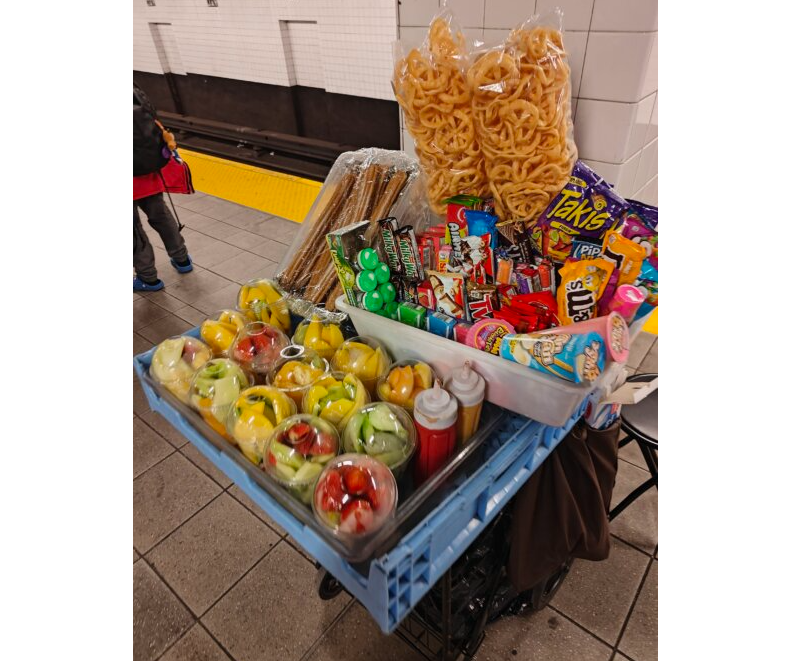
Paucar has made significant steps in her journey to live in the United States and vending has played a role.
Initially, after arriving in New York five months ago, she was living in a shelter with her husband and kids. But they were determined to leave, fueled in part by their inability to cook for themselves at the facility. Her kids were not accustomed to the food they were given and her youngest, she said, needed baby food.
Selling retail items isn’t new for Paucar. In her hometown of Gualaceo, in a rural mountain region, she spent most days selling fresh food and all kinds of products at markets. Meanwhile, her husband worked in agriculture. But the pair decided to flee Ecuador with their family, with Paucar saying that they were being extorted by a local armed gang.
Now they live in a studio apartment with their four kids. Their largest expense is their $1,000 rent and their utility bills, which “are never late to come,” she said.
Paucar buys the freshly made snacks that she sells at Jay Street from another Ecuadorian immigrant. She has to dispose of what she doesn’t sell at the end of each day. She gets packaged products like candy bars and gum from a supplier in Jamaica, Queens. She said buying in bulk would be more profitable for her, but she can’t afford to.
Paucar is among the 70,000 immigrants — of the 140,000 who have arrived since spring 2022 — who are no longer living in a shelter. She and her family managed to leave by their own means before hitting the 60-day limit the city recently imposed on immigrants to find alternative shelter.
Her industriousness is why many New Yorkers advocate for the immigrants and believe they should be permitted to stay. Her tenaciousness is also supported by studies.
“Immigrant New Yorkers are more likely to be employed, are more likely to create jobs by starting a business, and contribute billions of dollars to our New York economy in spending power and tax revenue,” according to a statement released earlier this month by the Center for Global Development and other academic institutions based on a study.
But the road to integrating with mainstream society is not easy for vendors such as Paucar.
Federal law requires most asylum seekers like her to wait 180 days, or six months, to be considered for a work permit. Delays in the approval system have made that wait even longer. According to the Migration Policy Institute, approximately 1.6 million applications for employment authorization were sitting in a backlog at USCIS as of October 2023, more than double the 676,000 pending in March 2020.
For some, the six-month waiting period does not apply. There is a faster way for some immigrants that cuts the wait down significantly — although that does not apply to Paucar or her family as Ecuadorian immigrants.
“A minority of asylum seekers that have been given humanitarian parole or TPS, so Temporary Protected Status, those folks can apply right away [for work authorization],” said Masha Gindler, executive director of the Asylum Application Help Center.
This policy applies to Venezuelan nationals who account for about 40 percent of the migrants who have arrived in the five boroughs since last year, according to City Hall estimates. For others, it aggravates the wait.
Paucar argues that being from Ecuador has put her at a disadvantage.
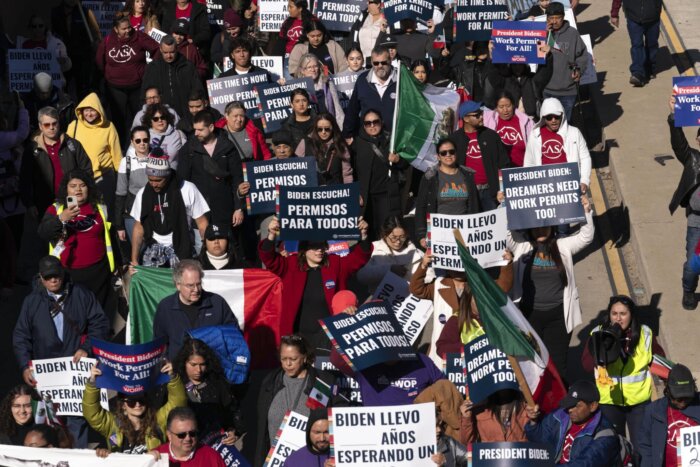
“At the shelters, city workers would only prioritize Venezuelans and the rest of us were left aside,” Paucar claimed. “We’ve had to look for help all on our own and out of our own pockets.”
But seeking legal help in a new city is not easy and it has made Paucar susceptible to be scammed.
“We paid $1,000 to a lawyer in Queens who said he would help us over a month ago and now we can’t get ahold of them,” said Paucar, who didn’t want to reveal the lawyer’s name in the hopes of receiving help soon. “They won’t answer the phone.”
Many immigrants find themselves in similar situations. Attorney General Letitia James filed a lawsuit on January 22 against a Bronx immigration lawyer, Kofi Amankwaa, and four others in his office for running an illegal scheme that scammed hundreds of immigrants into paying thousands of dollars for fraudulent services that caused many to be deported or have their green card applications denied.
“When these immigrants sought help from attorneys claiming to act in their best interests, they were taken advantage of and harmed instead,” James said. “This cruel and illegal scheme led to them being separated from their families and deported.”
‘All we want is to be allowed to work’
While Paucar is now wary of legal sharks and federal officials, she is also concerned about authorities on a day-to-day basis.
Without a vending license, Paucar is in a constant hide-and-seek dynamic with NYPD officers who patrol the station for security.
“When we see them coming, we have to pack our things and walk away,” she said. “Sometimes we just wait a few minutes until they move along, sometimes they tell us we have to leave the station and some bag all our products and leave us clean.”
She also hides from people who might draw attention to her vending without a license.
“A lot of people come to me trying to ask me questions for their TikToks,” she told Brooklyn Paper, worried that her face could be plastered all over social media.
She is also concerned about being bullied by those who dislike immigrant vendors.
“Most of our clients are kind, but some even try to kick us.”
This is all worth it to Paucar who sees no other alternative in order to secure a future for her children. Her three older kids attend a school on Marcy Avenue in Brooklyn.
“They will have more opportunities here than where we come from,” she said.
The news out of Ecuador is grim and the prospects for her children there would be limited, she said. Among many economic and social altercations, the South American country saw an armed gang attack two weeks ago. President Daniel Noboa declared a 60-day state of emergency, imposing a nationwide curfew and deploying the military onto the streets.
Economic crises started way before Paucar finally decided to leave. Now at Jay Street, her financial struggles continue, but her hopes that her work status will change keep her afloat. Meanwhile, she just forges ahead.
“We show up here to work every day, with a clean appearance, in an honest way, without any desire to beg for money,” said Paucar. “All we want is to be allowed to work.”
Editor’s note: A version of this story originally ran in Brooklyn Paper. Click here to see the original story.
Related Stories
- City Evacuates Migrant Shelter at Floyd Bennett Field Ahead of Storm
- Former Gowanus Brewery, Clinton Hill Warehouse Slated to Become Migrant Shelters
- For Families at Floyd Bennett Field, Getting Used to the Cold Is the Hardest Part
Email tips@brownstoner.com with further comments, questions or tips. Follow Brownstoner on Twitter and Instagram, and like us on Facebook.

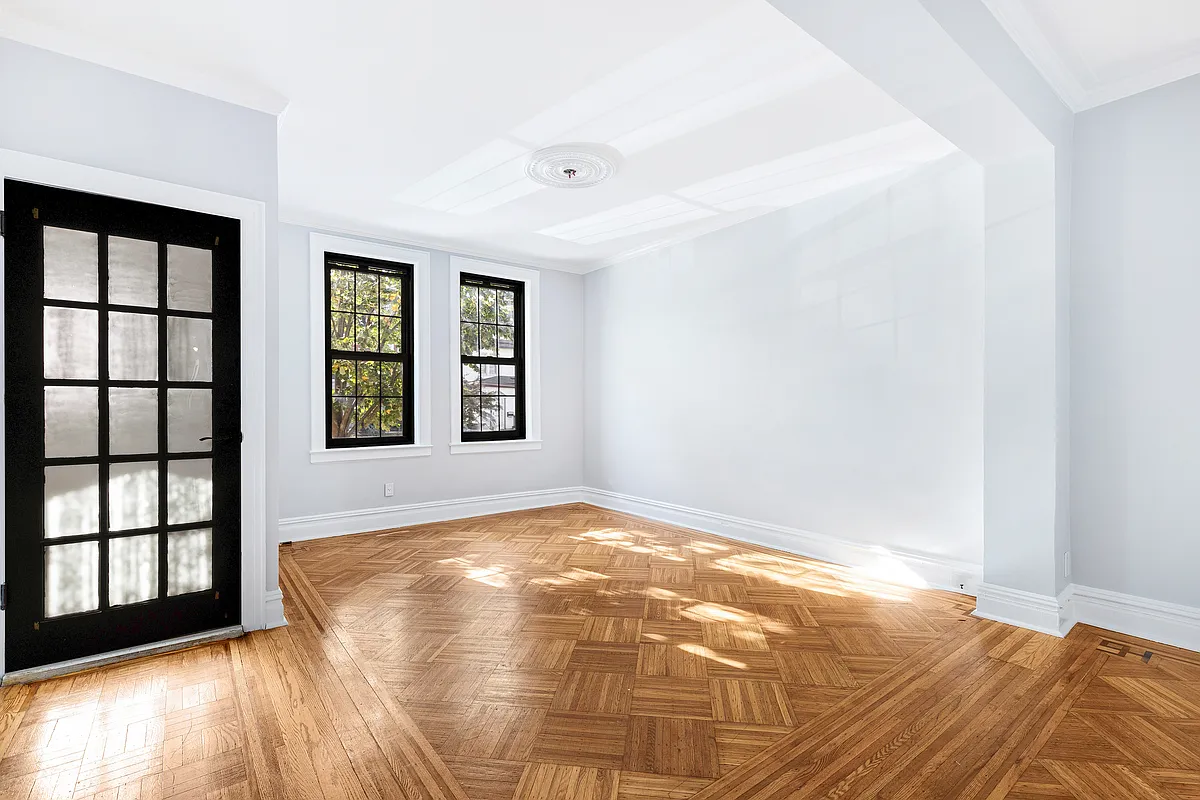

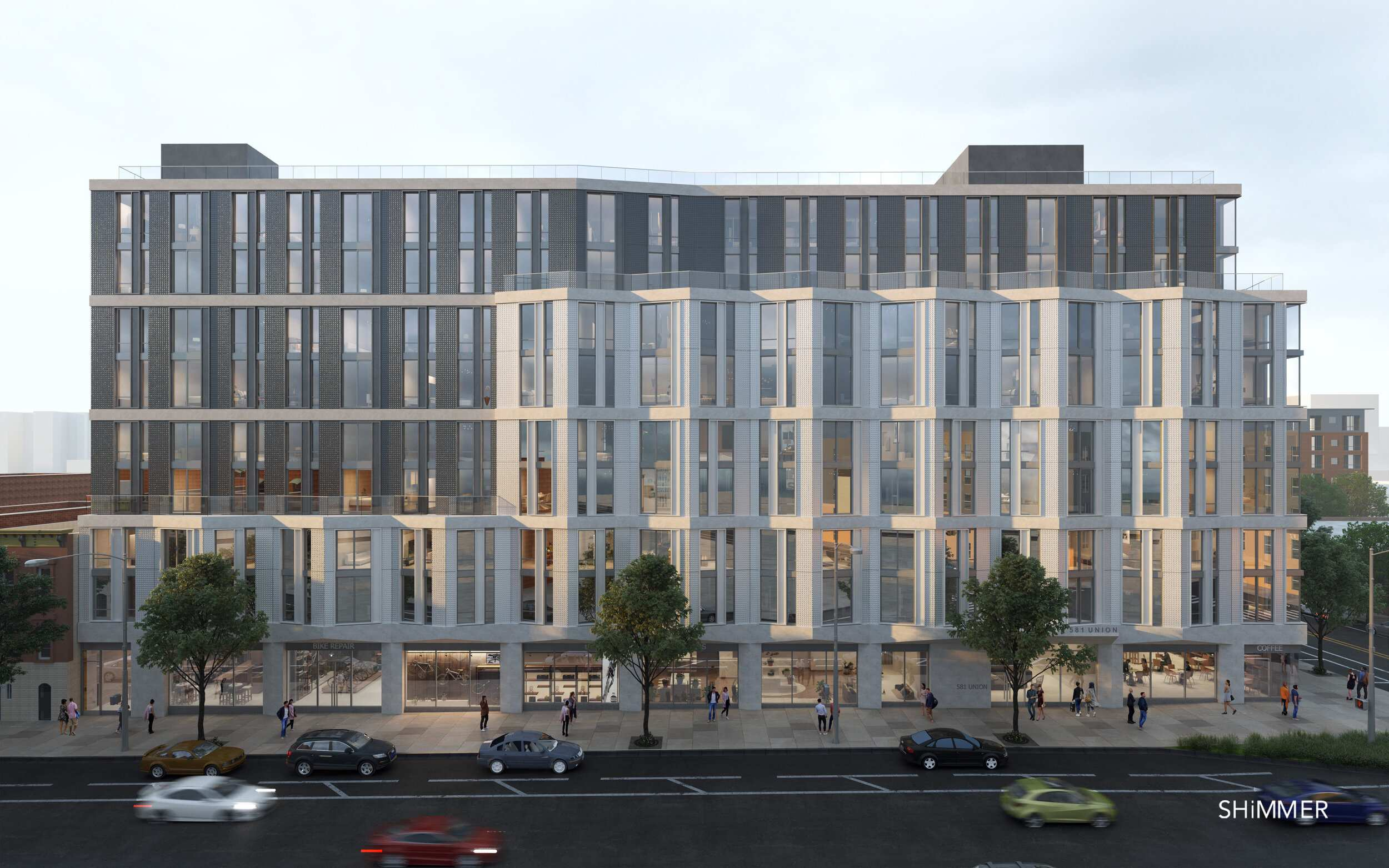
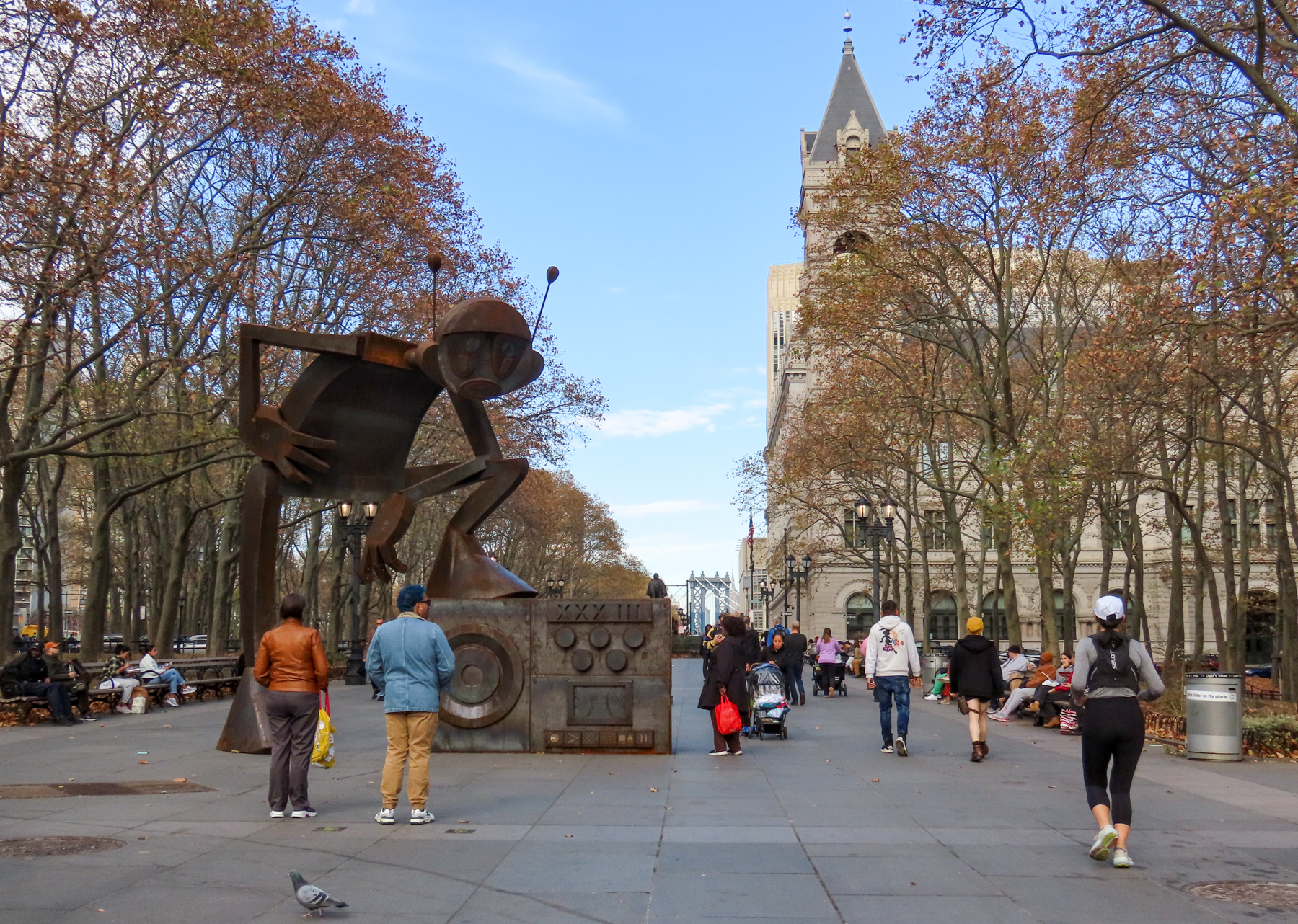




What's Your Take? Leave a Comment